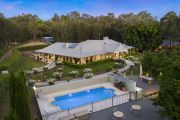
Ex-Brookfield CFO seeks $50m for equity push into housing projects
Former Brookfield Asset Management chief financial officer Andrew McVeigh is shifting from private credit to private equity after launching a $50 million raising for a real estate fund that will invest in a portfolio of mostly residential projects.
Mr McVeigh, who founded alternative asset manager Remara in 2017 after a nine-year stint at Brookfield, including two years as Asia Pacific CFO, hopes to generate returns of 20 per cent by leveraging off Australia’s chronic housing shortage.

“We have five seed investors and another 25 committed investors and hope to raise an initial $50 million for an equity-based real estate fund,” Mr McVeigh told The Australian Financial Review. “We see a natural limit of about $500 million.”
The fund will be open to retail investors and Mr McVeigh expects it to appeal to self-managed super funds and family offices.
The challenges created by higher interest rates, planning delays and rising construction costs that had led to a national housing shortage, had “created the perfect timing for capital investment into the sector”, he said.
He added that inhouse research indicated investors were looking for alternatives to the volatile share market.
The move into equity-style development follows Remara’s success on the debt side of the ledger.
It manages more than $1.6 billion in Australian-based credit assets, though most of this has been in the form of loans to small and medium-sized businesses, rather than loans to developers.
Large pool of loans
Mr McVeigh said his equity-based real estate fund would give investors exposure to an asset class that was difficult to gain access to. By investing in a portfolio of housing projects, the fund would reduce the overall risk profile.
“Remara’s credit strategy is built on diversification with a large pool of loans, reducing the reliance on one obligor and turning the outcome into a highly measurable statistical outcome,” he said.
“We’re hoping to mimic what we have done with our credit funds, but through an equity-style solution.”
While the primary focus will be on investing in smaller residential projects including regional land subdivisions, the fund will also be able to invest in other asset classes such as industrial and childcare if the projects stack up.
Projects of between $15 million and $40 million in end value will be targeted, with the fund to take about 70 per cent stakes in each. Returns will be generated from a share of profits and from an increase in value of units in the fund driven by capital growth.
“We like regional markets because part of the challenge you face is that there is a lot of focus on apartments in metro areas,” Mr McVeigh said.
“What we target are pockets of the market, where there is less competition and where none of the big listed or private developers participate, but where there is big demand for housing on full-size blocks.”
Remara already has three projects held on its balance sheet that will go into the new fund. One of them has DA approval, a second will soon commence construction and a third is going through the planning process.
“We will partner with proven developers and provide them with access to capital to complete projects and grow,” he said.







